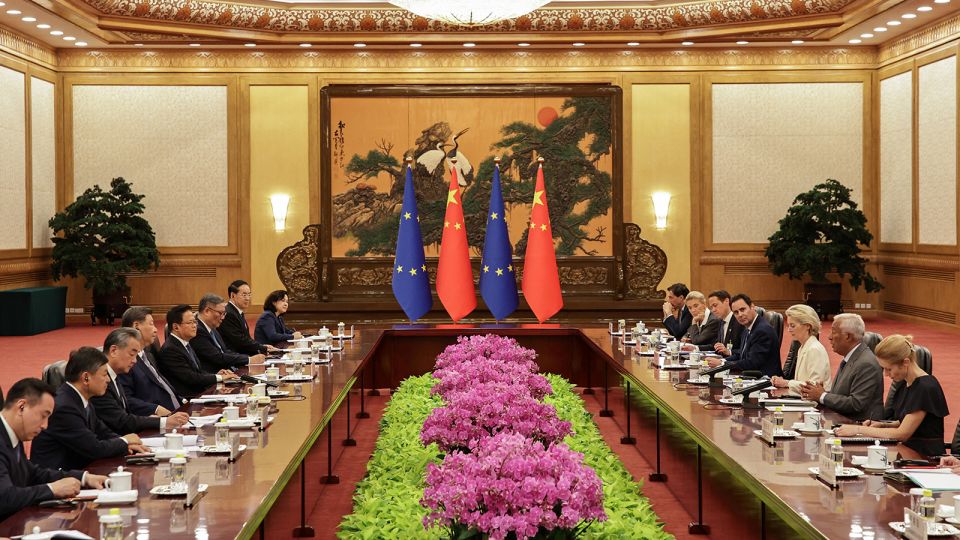Chinese leader Xi Jinping told visiting European Union leaders that Europe should make “the right strategic choice” and enhance cooperation with China for global “stability,” as the two sides tackle deep-seated grievances at a key summit.
Xi met with European Council President Antonio Costa and European Commission President Ursula von der Leyen in Beijing on Thursday morning, China’s state broadcaster CCTV reported.
The European leaders are in Beijing for what is expected to be a contentious summit, at a time of growing tension and mistrust between the two sides over their gaping trade imbalance, China’s ongoing support for Russia in the Ukraine war, and – most recently – Beijing’s chokehold on the rare earths supply chain.
Von der Leyen told Xi that the EU’s economic ties with China – running at a trade deficit of 300 billion euros ($350 billion) last year – had reached “an inflection point.”
“As our cooperation has deepened, so have imbalances,” she said. “Rebalancing our bilateral relation is essential…It is vital for China and Europe to acknowledge our respective concerns and come forward with real solutions.”
The summit, which has been whittled from a planned two days to a single-day event, is ostensibly meant to celebrate 50 years of diplomatic ties between Beijing and the EU.
But expectations are low and it is expected to instead showcase a widening rift between the two sides – even though both had signaled hopes for a reset in relations just months earlier, as they faced down US President Donald Trump’s global tariff war.
On Thursday, Xi told Costa and von der Leyen at the Great Hall of the People that the challenges currently faced by Europe “do not come from China,” and that there are “no fundamental conflicts of interest or geopolitical contradictions” between Beijing and the bloc, according to a readout from China’s Foreign Ministry.
“In the face of accelerating changes not seen in a century and a turbulent international landscape, China and EU leaders must once again demonstrate strategic vision and responsibility, making the right strategic choices that meet the expectations of the people and stand the test of history,” Xi said, according to CCTV.
Without directly mentioning Trump’s trade war, Xi emphasized that both China and the EU are “constructive forces that support multilateralism and advocate for openness and cooperation.”
“The more severe and complex the international situation becomes, the more China and the EU need to strengthen communication, enhance mutual trust, and deepen cooperation, so as to provide more stability and certainty to the world through a stable and healthy China-EU relationship,” Xi was quoted as saying.
Chinese leader Xi Jinping gives his opening remarks at a meeting with top European Union officials at the Great Hall of the People in Beijing on July 24, 2025. – Andres Martinez Casares/AFP/Getty Images
Widening rift
The EU was far from shy about its grievances in the lead-up to the summit. Officials in recent weeks have reiterated concerns over what they say are inexpensive Chinese goods “flooding” European markets, Beijing’s recent move to squeeze the rare earths supply chain, and its ongoing backing for Russia as it wages war in Ukraine.
Beijing has lashed out against those concerns, including the 27-member bloc’s move last year to raise tariffs on its electric vehicles, launching a range of its own trade probes in apparent retaliation.
After the EU last month announced it was barring Chinese companies from participating in public tenders for medical devices over a certain value, Beijing hit back with its own curbs on government purchases of Europe-made devices.
On Thursday, Xi called on the EU to keep its trade and investment markets open, “exercise restraint” in using restrictive trade and economic measures, and provide a favorable business environment for Chinese enterprises investing and operating in Europe.
China’s Ministry of Commerce has also slammed the EU decision to include two Chinese banks and a handful of other firms in its latest sanctions against Russia over its invasion of Ukraine. It claimed the move would have a “severely negative impact on China-EU economic and trade relations.”
On Tuesday, Commerce Minister Wang Wentao lodged solemn representations — diplomatic speak for formally expressing serious discontent — over the sanctions in a video call with EU trade chief Maros Sefcovic.
Trump’s trade war – and his negotiations with both major economies – is also casting a long shadow over the summit.
There were signs earlier this year that Beijing hoped shared adversity in the face of tariff threats from the US could push China and Europe together.
But in separate addresses to G7 leaders and European lawmakers in recent weeks, von der Leyen made clear the bloc’s deep concerns about Beijing were unresolved.
“China is using this quasi-monopoly (on rare earths) not only as a bargaining chip, but also weaponizing it to undermine competitors in key industries,” she told G7 leaders meeting in Canada in June.
Beijing has extensive control over supply chains for these critical minerals key in everything from EV batteries and cell phones to fighter jets. It roiled the global manufacturing industry after placing export controls on some such minerals in April amid its trade spat with the US. China agreed during a truce with the US in June to ease these controls.
Von der Leyen also called for unified G7 action to pressure Beijing as it “floods global markets with subsidized overcapacity that its own market cannot absorb.”
For more CNN news and newsletters create an account at CNN.com

